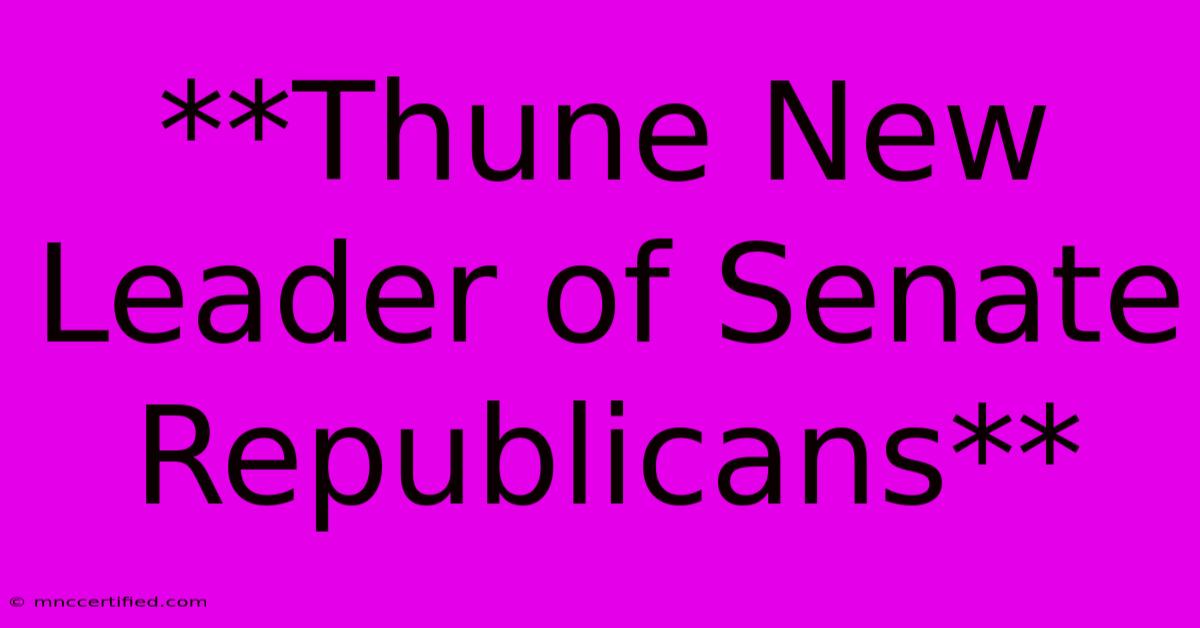**Thune New Leader Of Senate Republicans**

Table of Contents
Thune: The New Leader of Senate Republicans
John Thune, the Republican senator from South Dakota, has emerged as the new leader of the Senate Republican conference. His ascension to this prominent position comes after Mitch McConnell stepped down from the role, ending his 16-year reign as the Senate Republican leader.
Thune's Rise to Power:
Thune's journey to the top of the Senate Republican hierarchy is marked by a combination of political savvy, strategic alliances, and a strong track record.
- Early Career: Thune's political career began in the South Dakota House of Representatives before he was elected to the US House in 1996.
- Senate Entry: In 2004, he won the Senate seat, defeating the incumbent Democrat, Tom Daschle.
- Key Role: Thune quickly established himself as a key player within the Republican caucus, becoming a prominent voice on issues related to energy, finance, and technology.
- Leadership Position: He was elected the Senate Republican Whip in 2011, further solidifying his position as a rising star in the party.
McConnell's Legacy:
McConnell, the longest-serving Senate Republican leader in history, leaves behind a legacy shaped by his strategic political maneuvering and focus on conservative policy priorities. He successfully guided the confirmation of three conservative Supreme Court justices, a key achievement for the party.
Thune's Leadership Challenges:
Thune inherits a Senate Republican conference facing a complex set of challenges:
- Divided Party: The Republican party is increasingly divided on key issues, leading to internal tensions and making it challenging for Thune to unite the caucus.
- Evolving Political Landscape: The political landscape is rapidly shifting, with demographic changes and emerging issues creating new challenges for the party.
- Competitive Election Cycle: The 2024 election cycle promises to be highly competitive, with control of both houses of Congress at stake.
Thune's Vision for the Future:
Thune's leadership style is characterized by a focus on consensus building and a pragmatic approach to policymaking. He is known for his ability to forge relationships across the aisle and find common ground on issues where possible.
- Key Priorities: Thune has identified economic growth, job creation, and national security as his top priorities. He is committed to working with Republicans and Democrats to address these issues, but also stands ready to oppose policies he believes are harmful to the country.
Thune's leadership will be tested as he navigates the complexities of the Senate and the challenges facing the Republican party. His ability to bridge divides, build consensus, and adapt to the evolving political landscape will determine his success in this new and demanding role.

Thank you for visiting our website wich cover about **Thune New Leader Of Senate Republicans** . We hope the information provided has been useful to you. Feel free to contact us if you have any questions or need further assistance. See you next time and dont miss to bookmark.
Featured Posts
-
Red Panda Cub Dies In Scotland Zoo
Nov 14, 2024
-
Elon Musks Space X Internet Access Revolution
Nov 14, 2024
-
Wembanyama Scores Career High 50 In Spurs Win
Nov 14, 2024
-
Rental Car In Fannett Invest Rakyat
Nov 14, 2024
-
John Krasinskis Wife Emily Blunts Hilarious Reply
Nov 14, 2024